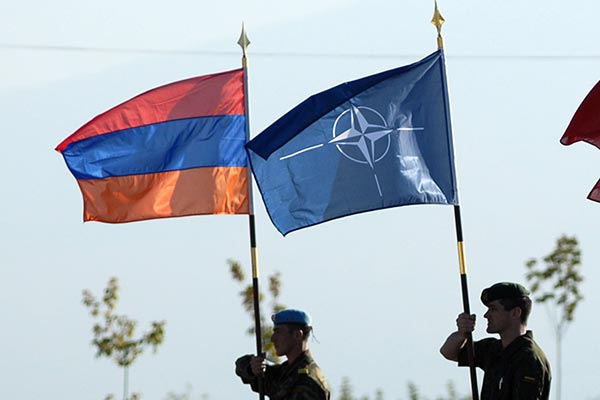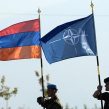
Armenia and NATO Reaffirm Their Cooperation
Publication: Eurasia Daily Monitor Volume: 12 Issue: 22
By:

On January 15, the President of Armenia, Serzh Sargsyan received James Appathurai, the NATO Secretary General’s Special Representative for the Caucasus and Central Asia. They expressed satisfaction with the fact that Armenia’s relations with the North Atlantic Treaty Organization are developing normally, and there is a mutual desire to continue deepening their effective political dialogue and partnership in all areas of cooperation (President.am, January 15). Additionally, the NATO representative underlined Armenia’s considerable contribution to the Alliance-led peacekeeping operations in Kosovo and Afghanistan, thereby reiterating Armenia’s commitment to helping promote international peace and stability and boosting partnership. Appathurai and Sargsyan also discussed regional issues—including, the Karabakh conflict resolution process—as well as the present concerns, contemporary international challenges and measures aimed at dealing with them.
Moreover, Appathurai held meetings with the Armenian ministers of foreign affairs and defense, Edward Nalbandian and Seyran Ohanyan, respectively, as well as representatives of the National Assembly of Armenia, touching upon issues of political, military and parliamentary cooperation (Mfa.am, Razminfo.am, Parliament.am, January 15).
Yerevan continues to participate in the Western mission in Afghanistan. On January 11, 2015, a contingent of 65 Armenian peacekeepers was sent to Germany in order to take part in a training program within the North Atlantic Alliance framework. The training program will last for one month, and upon its completion, the Armenian peacekeeping contingent will be deployed alongside German military units of the International Security Assistance Force (ISAF) to defend the Mazar-i-Sharif airport, as well as the nearby ISAF military base. Appathurai emphasized the fact that out of the three republics in the South Caucasus, Armenia was the first to accomplish all the steps necessary for its full participation in ISAF’s new mission in Afghanistan (Armenpress.am, January 15). The deepening cooperation in peacekeeping operations clearly shows that both NATO and Armenia are interested in strong ties with each other.
Though Armenia is not a member of the Alliance, the organization pays close attention to this country. First of all, most, if not all, former Soviet republics require substantial support from international bodies to help reinforce their security and engage in multilateral political-military cooperation, both in the post-Soviet space and other regions. Some of these states cooperate within the framework of the Moscow-led Collective Security Treaty Organization (CSTO); however, sufficient room still exists for much broader or deeper cooperation in the security sphere, especially with NATO. Second, Armenia neighbors the Middle East and Iran. And NATO pays particular attention to countries that are directly or indirectly connected to this strategically important though turbulent area. Third, NATO values Armenia’s contribution to the Alliance’s peacekeeping operations around the world, which include Armenian military deployments to NATO missions in Kosovo (KFOR) and Afghanistan (ISAF). Furthermore, Armenia is actively engaged in the Alliance’s Partnership for Peace (PfP) program, the PfP Planning and Review Process (PARP), and the Partnership Action Plan Against Terrorism.
Armenia’s willingness to cooperate so closely with NATO is noteworthy from a political and foreign policy standpoint. Yerevan is a member of several Russia-led integrationist organizations—most notably the Commonwealth of Independent States (CIS), the CSTO and, most recently, the Eurasian Economic Union (EEU). Nonetheless, Armenia tries to simultaneously pursue a complementary policy of bolstering its cooperation with the United States and Europe, including by reaching out to Euro-Atlantic organizations such as the European Union, the Council of Europe, the Organization for Security and Cooperation in Europe (OSCE), and NATO. The North Atlantic Alliance, specifically, plays an important role in improving and reforming the Armed Forces of Armenia through military education, training exercises, and so on. Moreover, Armenian contingents gain additional combat experience by participating in NATO-led peacekeeping operations. This ongoing, tangible engagement reinforces the credibility of the West in the eyes of the Armenian military, and it provides an opportunity for the latter to contribute to peace and security in the world. Though NATO is not engaged in the Karabakh negotiations, it fully supports the OSCE Minsk Group Co-Chairs in their mission and always condemns the conflict’s ceasefire violations, Appathurai said while in Yerevan (Armenpress.am, January 15).
However, a key issue likely to dominate NATO-Armenia relations in the near term will be the question of how Armenia’s accession to the Eurasian Economic Union may impact the country’s cooperation with the Euro-Atlantic political-military alliance. Signing the membership agreement on October 10, 2014, Armenia became the fourth member of the EEU, which went into force on January 1, 2015. Furthermore, it should be noted that, unlike Azerbaijan, Georgia, Ukraine and Moldova, Armenia is a member of the CSTO—this make Armenia the only state among its closest post-Soviet neighbors that simultaneously cooperates with both regional military alliances. In November 2013, Armenia refused to initial the Deep and Comprehensive Free Trade Agreement (DCFTA) with the EU, but its relations with NATO remained unchanged at that time. During his visit, Appathurai ensured that Armenia’s membership in the EEU and CSTO will not overshadow Armenia-NATO cooperation. Moreover, the North Atlantic Alliance intends to expand its relationship with Yerevan in the framework of an Individual Partnership Action Plan, especially in the areas of military education, intercultural communication and anti-corruption efforts (Armenpress.am, January 15). Thus, it appears that, at least for now, the deepening of Russian-Armenian relations and the ongoing crisis between Russia and West over Ukraine will not undermine Armenia’s relationship with NATO.




